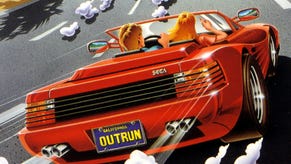Retrospective: Mass Effect
Lovin' an elevator.
Those poor old elevators. In case you haven't heard, one of Mass Effect's weirdest features has been officially shelved in favour of more load screens. Yes, the lifts were incredibly slow. For example, Mass Effect is a science-fiction RPG where male characters can fall in love with one of two female crewmates, and I chose Liara because the alternative, Ashley, hangs out in the Mako garage, and thanks to the lift sequence separating the garage from the rest of your spaceship this constituted an unworkable long-distance relationship. That slow. But at least they weren't load screens.
Mass Effect has enough of those already. So many, in fact, that an uncharitable observer might argue that the huge scale of BioWare's intergalactic civilisation is largely supported by the volume and duration of loading delays that punctuate every journey. After all, it's far easier to suspend your disbelief - even while you're locked in dense social and political discussions with blue-headed bisexual alien mystics and giant voles - when even nipping to the shops involves putting yourself into cryogenic stasis outside the game as well as within.
That uncharitable observer would be wrong, however, because if you ask me the vastness of the foundations of this particular galaxy isn't a byproduct of Mass Effect's load screens, and to go around thinking as much would be as daft as a car with a jump button. Ha ha. But seriously, the settings also function because of decisions made by the Citadel Council and, aptly, the gravity they manage to convey.
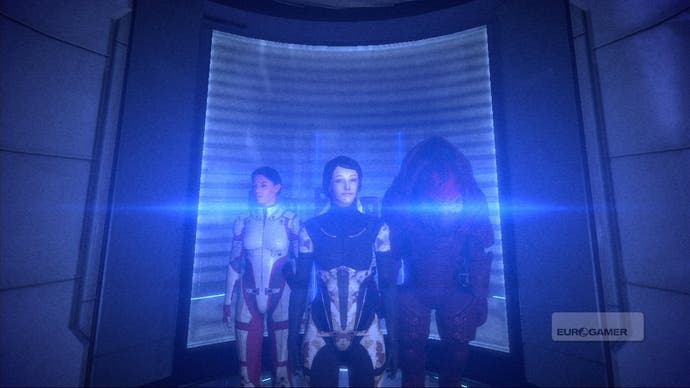
Like all BioWare games, Mass Effect isn't so much steeped in lore as waterboarded. Humans are one of a number of races who have colonised space and hold a presence on the Citadel, an alien space station that is, for all intents and purposes, the centre of the galaxy, and along with its alien "mass relays" allows for wide-scale exploration of deep space. Everyone seems pretty happy with the fact they lucked into all this alien technology, which used to belong to the now-extinct Protheans, rather than inventing it, but then it has been a unifying force for advanced civilisations from across the 'verse, so that's alright then. Probably.
The Citadel is presided over by the aforementioned Council, which has representatives of the reptilian Turians, blue-headed science boffins the Asari, and the weirdo espionage-loving Salarians. But not humans. Which is where you come in: you, Commander Shepard, are humanity's great inroad, because you're being considered for Spectre status. Spectres are like special galactic police who go around doing whatever the hell they like, and it would be a huge honour if they made you one, so another Spectre, a Turian called Nihlus, is working alongside you on the Normandy as you travel to the human colony of Eden Prime to retrieve a Prothean artefact - a beacon. You're on best behaviour.
So of course it all goes horribly wrong. Nihlus is killed, the beacon is destroyed, and Shepard is exposed to some sort of incomprehensible Prothean home video that may or may not be the key to the history of the universe. And it's at this point I got stuck in the game's gravitational pull, because despite going before the Council and explaining that naughty Spectre agent Saren is responsible, and presenting an eyewitness account of him murdering Nihlus, the Council says this is circumstantial. You don't just need a smoking gun when it comes to decisions that affect trillions of lives, you need a burning rainforest sticking out of a Death Star.
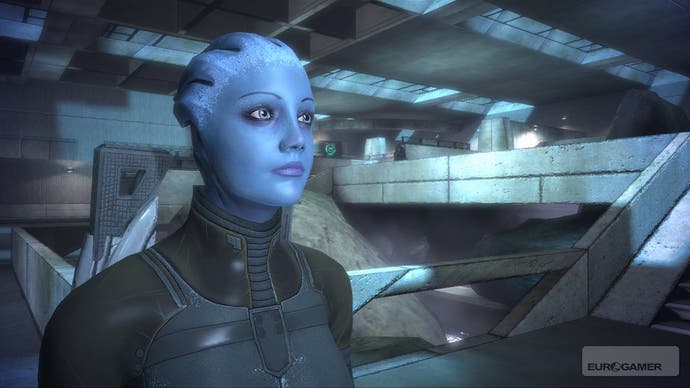
A game with a lot of information to impart better be good at it, and Mass Effect is, for the most part, thanks to a good conversation system where you use the analogue stick to point to possible responses. You don't always get six options, but there are six possible positions for the options to appear in, and each is a particular flavour of reply; charming and intimidating comments, for example, are always top-left and bottom-left respectively when they're available.
Because you already know the tone of the option you're pointing at, BioWare can also be economical with what you're actually clicking on, so each option is represented by a few words. While you may click on "Let's go", Shepard may say "We should get this f***ing show on the road mof***ers." This was an awesome move, because unlike many of its RPG predecessors you don't feel like you've already answered by the time you hit the button; you direct exchanges rather than waiting for your character to mouth the sentiment you've just expressed with the A button. (Incidentally, in order to avoid even the slightest story spoiler, I have invented dialogue for the above examples. Mof***ers.)
The line between narrative cause and explosive effect is nonexistent, too, which also enhances the game's storytelling. The shooter-influenced combat was originally criticised in some quarters (these quarters, for example), and there was a backlash against this criticism in the pointy-hat community, but there are a couple of problems with their position. Not least of these is that it's a bit silly to moan at critics approaching the game from shooter backgrounds who don't rate it as a shooter, given that BioWare would be the first to admit Mass Effect is built around projectile weapon combat as much to court that crowd as anything. And also, however much you love the game - and I love Mass Effect - you have to admit that the cover mechanics were a bit 2006. It was 2007!


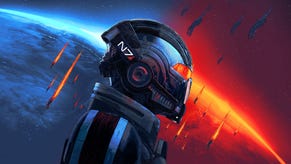
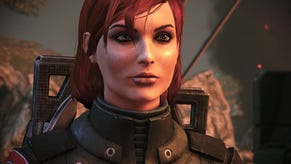

_bv0fQvp.jpg?width=291&height=164&fit=crop&quality=80&format=jpg&auto=webp)

